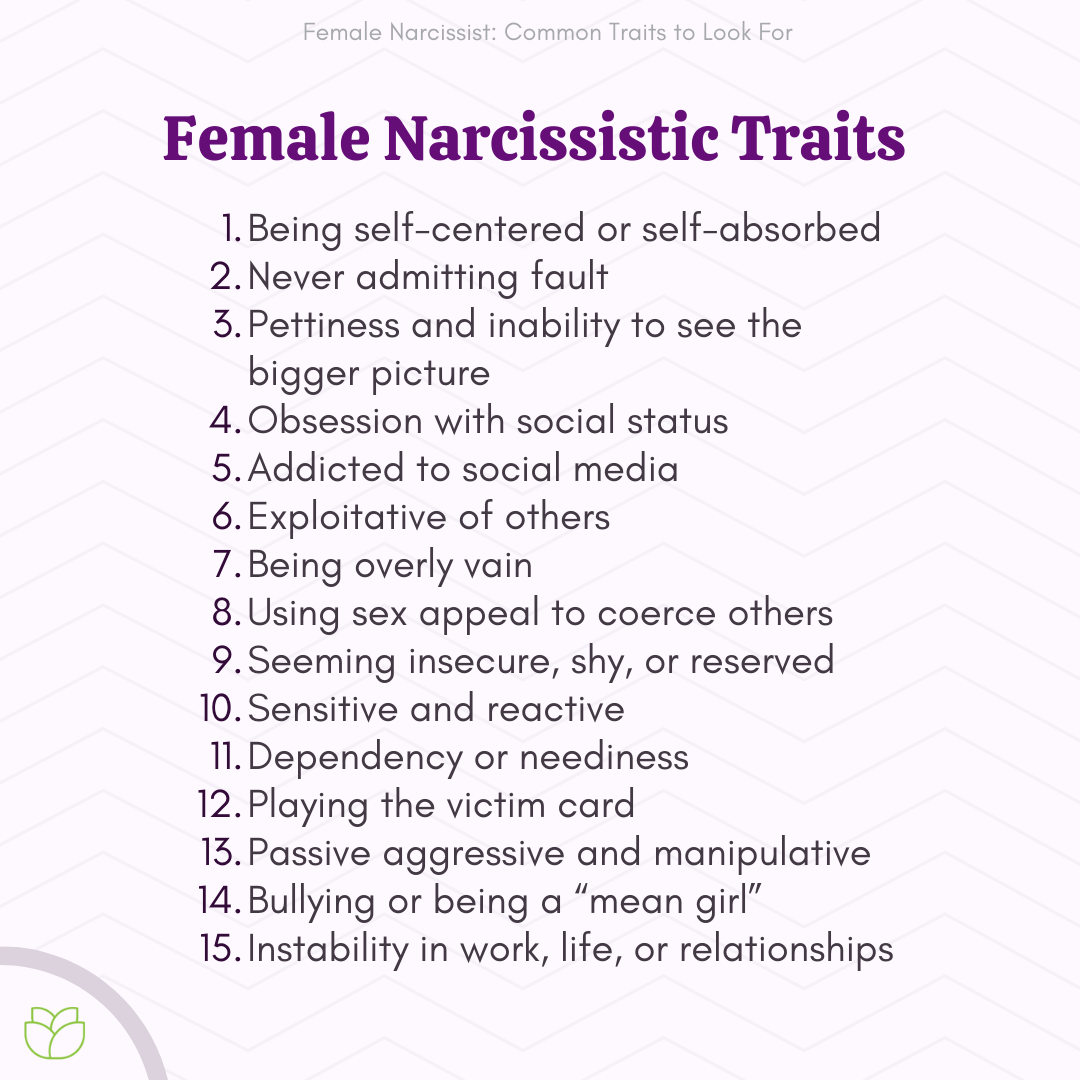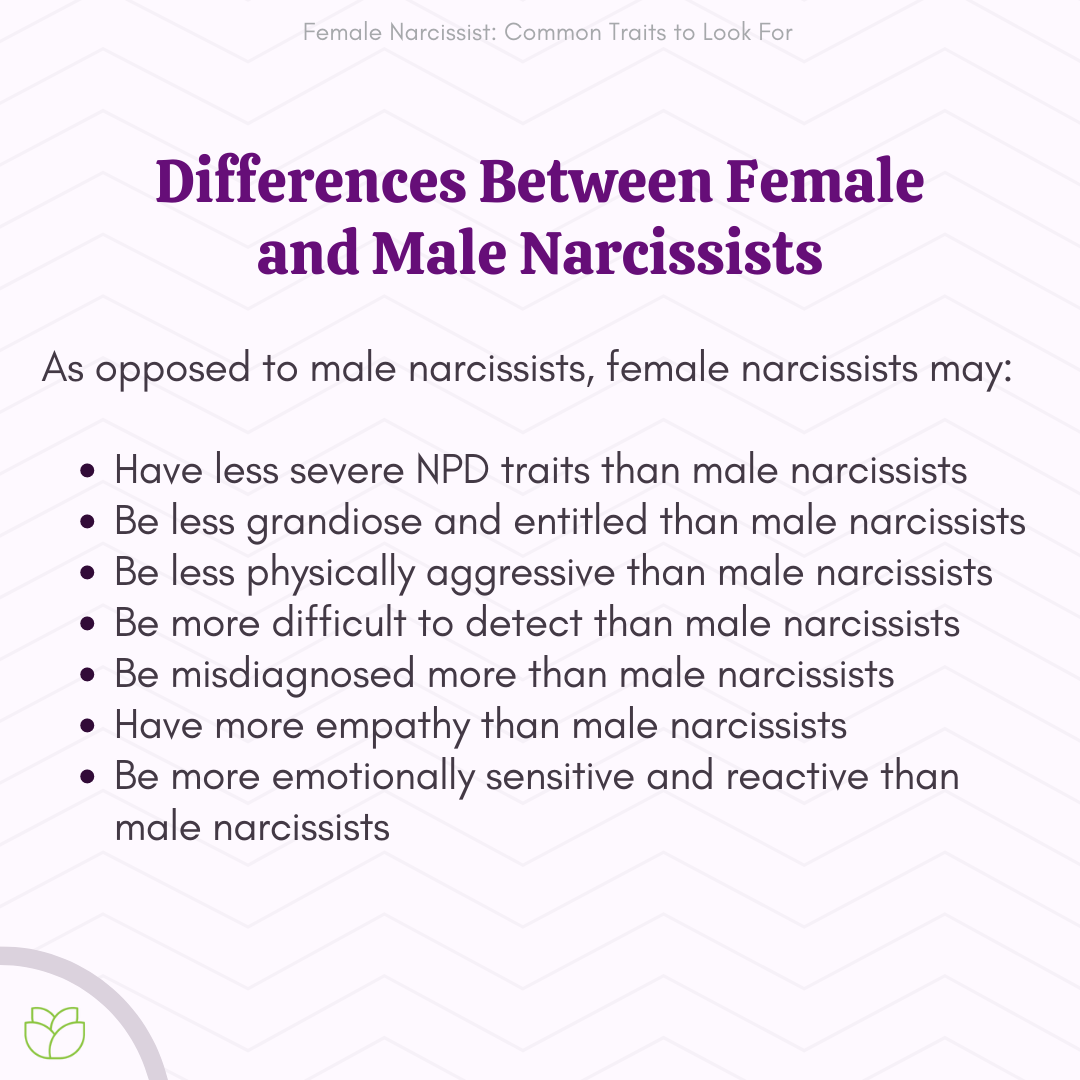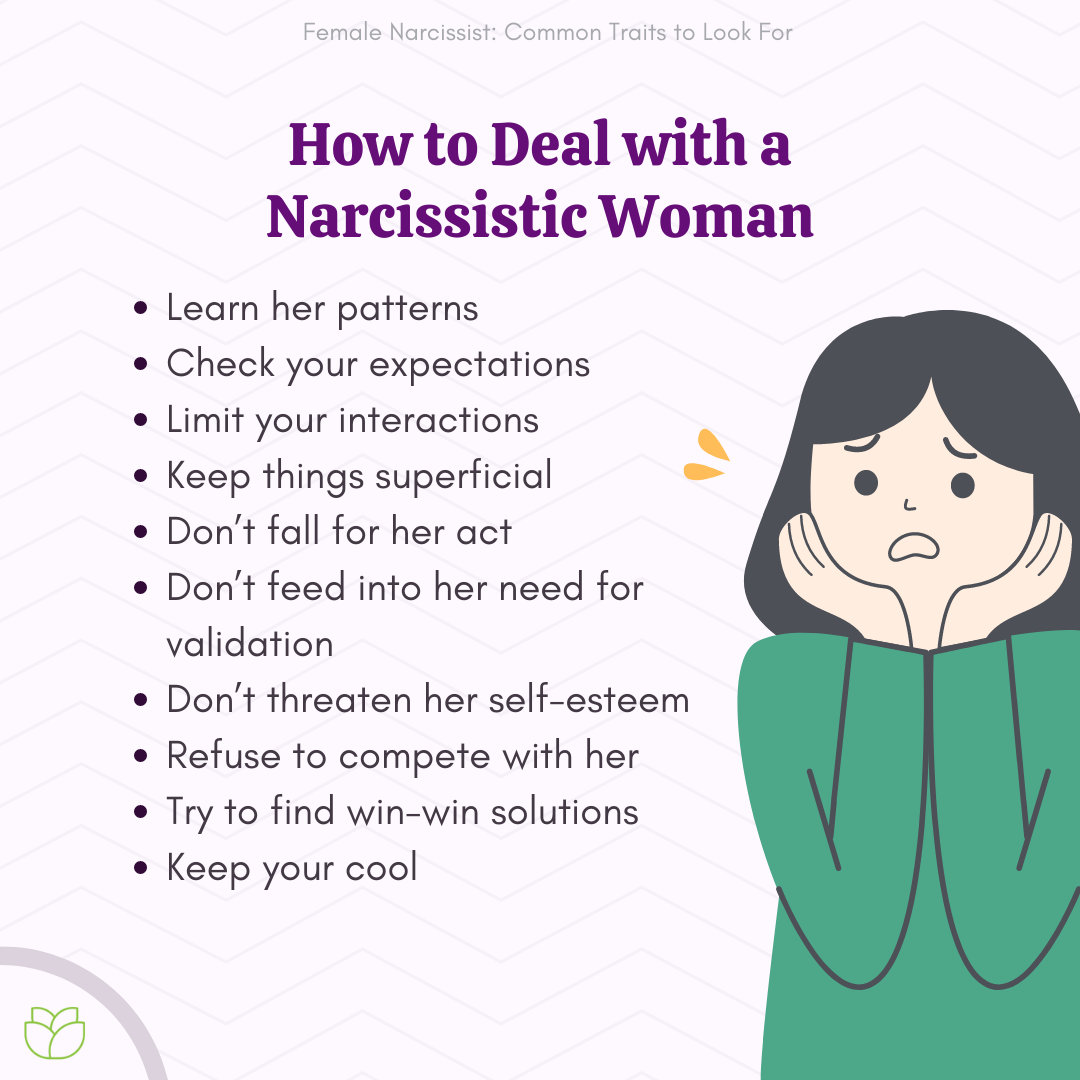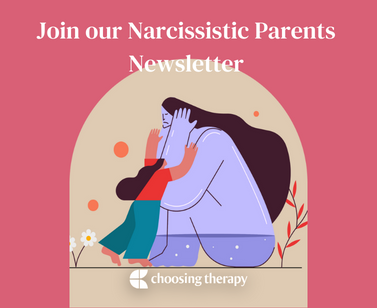Narcissistic personality disorder (NPD) is a personality disorder characterized by grandiosity, entitlement, and an excessive need for external validation.1 Typical NPD symptoms may display differently and less severely in women, making it harder to detect them.2, 3, 4 While female narcissists are less common than male narcissists, they possess some tell-tale traits that can be used to identify them.
You Can Escape From A Narcissist.
Therapy can help you leave or recover from a narcissistic relationship. BetterHelp has over 20,000 licensed therapists who provide convenient and affordable online therapy. BetterHelp starts at $65 per week. Take a Free Online Assessment and get matched with the right therapist for you.
What Is Narcissistic Personality Disorder?
While people with narcissistic personality disorder (NPD) can be superficially charming and likable at first, this false persona wears off quickly. Narcissists tend to be hypersensitive to criticism and highly defensive when they’re offended, which is often how their difficult personalities are revealed to others. When offended, someone with NPD will often become highly defensive, reactive, and even aggressive or hostile.
According to current diagnostic criteria, NPD is characterized by five or more of the following:1
- Grandiosity or an excessive sense of self-importance
- Fantasies of powerful, success, beauty, or importance
- A belief in being special or exceptional (sometimes with a desire to network with people of similarly high ‘status’ or ‘importance’)
- An excessive need for validation, praise and admiration from others
- A sense of entitlement or feeling like one deserves special treatment
- Exploiting others for personal gain or selfish reasons
- Lacking in empathy or unwilling to identify with the needs of others
- Being envious of others or believing others are envious of them
- Arrogant or haughty behavior, or acting better or superior to other people
Types of Narcissists
Some experts believe that there are distinct subtypes of NPD. While the same criteria listed above is used for diagnosing, it’s possible for a person to display slightly different traits and tendencies depending on their subtype.
Common types of narcissists include:5, 6
- Overt narcissist (aka classic or grandiose narcissist): An overt narcissist displays most of the traditional narcissistic traits and tendencies including grandiosity, entitlement, and behaving in a boastful manner
- Covert narcissist (aka insecure or vulnerable narcissist): A covert narcissist can be harder to detect because they may appear shy, humble, reserved, or even insecure to other people
- Communal narcissist: A communal narcissist is someone who appears selfless and generous with their time, money, and resources. They are likely to be very active in charities or other good causes, but use these roles to promote themselves, form a favorable impression, or create a reputation for being a ‘good person’
- Malignant narcissist: A malignant narcissist has traits and symptoms of both narcissistic personality disorder and antisocial personality disorder. They are considered dangerous, because they display a lack of empathy and a pattern on preying on others
- Healthy narcissist: Some researchers argue that there is a ‘healthy narcissist’ subtype that describes people with high self-esteem along with other NPD traits that do not interfere or cause problems in their lives or relationships
Are you dating or married to a narcissist?
Whether you’re trying to move on or rebuild a relationship, a licensed therapist can guide you. BetterHelp has over 20,000 licensed therapists who provide convenient and affordable online therapy. Visit BetterHelp
Is your mother, father, or family member a narcissist?
Being raised by a narcissist can damage your confidence and self-esteem. A therapist from Online-Therapy can help you both heal from the past, and manage the relationship to be less harmful. Counseling starts at $50 per week. Try Online-Therapy
15 Female Narcissistic Traits
Research on the differences between male and female narcissists suggests that NPD traits in women are fewer in number and less severe. Specifically, female narcissists are less entitled, impulsive, aggressive, and more empathetic than males diagnosed with NPD.2, 4 Female narcissists also may display certain distinct traits such as a preoccupation with their appearance or being more prone to envy and jealousy than males.2, 3
Below 15 common female narcissistic traits:
1. Being Self-Centered or Self-Absorbed
Self-centeredness is a hallmark sign of NPD in both men and women.1, 3 A female narcissist may spend a lot of time talking about herself and her life, without thinking to ask how others are doing. When people do interject to talk about themselves, the female narcissist may show little interest, and quickly turn the conversation back to herself.
2. Never Admitting Fault
Another telltale sign of narcissism is never admitting fault or apologizing, and instead finding ways to project blame outwards onto other people or situations.1 For example, narcissistic women will often deflect blame by making excuses for their mistakes or finding ways to twist the situation and paint someone else as the bad guy.
3. Pettiness & Inability to See the Bigger Picture
Narcissistic women can have a tendency to be petty. They often get stuck on small details or perceived wrongdoings of other people, even when they don’t really matter.1, 3, 5, 6 For instance, a female narcissist may be unable to stop obsessing over the smallest criticism or slight, and may even become hyper focused on getting revenge. This inability to let go of small grievances can become problematic for the narcissistic woman, making her seem jealous, petty, and bitter to others.
4. Obsession With Social Status
Being shallow or superficial is a common trait in both male and female narcissists.1 In women with NPD, this might show up as a tendency to be overly materialistic or preoccupied with brand name, luxury items or other status symbols associated with being wealthy. Other times, this may include excessive concern about social status, reputation, social media, or appearances.4, 7
5. Addicted to Social Media
All narcissists are self-absorbed, but this can be exhibited differently in female narcissists than in males. Women with NPD may be more likely to get wrapped up in social media, post selfies, and become obsessed with getting likes and followers online. Some may even be addicted to social media and unable to pull themselves away from the virtual realities they’ve created online.7
6. Exploitative of Others
Narcissists are known to exploit other people for personal gain or self-serving interests, but men and women may have opposing ways of doing so. For example, women with NPD will often use manipulative or passive aggressive behaviors to fulfill their needs, while narcissistic men may use force, intimidation, or physical aggression.2, 3
7. Being Overly Vain
While both men and women with NPD are prone to vanity, research shows that women with NPD are more likely to be preoccupied with physical appearance. Also, women with NPD may be more sensitive to criticisms about their physical appearance, weight, or attractiveness than men with the disorder.2, 3, 4 Narcissism in women may lead to excessive cosmetic procedures, extreme dieting, or an unhealthy obsession with appearance or weight.
Would you like help recovering from a relationship with a narcissist?
BetterHelp has over 20,000 licensed therapists who provide convenient and affordable online therapy. BetterHelp starts at $65 per week. Take a Free Online Assessment and get matched with the right therapist for you.
8. Using Sex Appeal to Coerce
Women with NPD may be more likely to capitalize on their sex appeal or physical attractiveness. Recent studies have found that many female narcissists dress in sexually provocative ways–like dressing in revealing clothing or wearing a lot of makeup.3 Some may use sexual seduction as a way to manipulate or financially exploit others, or engage in sexual narcissism. They may even become involved in parasitic sexual relationships with people who can support or help them in some way.8, 9
9. Seeming Insecure, Shy, or Reserved
Women with NPD are more likely to display signs of covert narcissism, experiencing traits that differ from the stereotypical portrayals of narcissism.3, 4 A covert narcissist may not seem arrogant, grandiose, or entitled, and may instead present as shy, quiet, and even insecure. When insecurity and low self-esteem are coupled with other signs and traits of narcissism, this often indicates covert narcissism.5, 6
10. Sensitive & Reactive
Female narcissists are often more emotional than their male counterparts, which also makes them more likely to be sensitive and reactive. While all narcissists tend to be sensitive to criticism, female narcissists may be more prone to being hurt, offended, or upset by others. This can also make them more likely to lash out, become moody or emotional, or shut down when upset.2, 3
11. Dependency or Neediness
Female narcissists (especially covert narcissists) may display needy or dependent patterns in their relationships with others.3, 4 The female narcissist typically needs a lot of validation, praise, and reassurance from her friends, family, and lovers, which betrays her underlying insecurities. Without this validation, she may become jealous, upset, moody, brooding, or experience emotional outbursts.2, 4
12. Playing the Victim Card
Playing the victim by being submissive or seemingly helpless may be a tactic that female narcissists use to get things they want or lure people in. Once they do, they will often use the martyr or victim card to exploit people or convince them to do things for them.2, 3 This tendency is one of the more common traits of a narcissist woman, which may be due to societal expectations and gender roles.3, 4
13. Passive Aggressive & Manipulative
Research on the sex differences in NPD have consistently found that female narcissists are less physically aggressive than male narcissists, and more likely to use passive aggression and manipulation to coerce other people.2, 3 For instance, a female narcissist might manipulate others by playing the victim, going behind someone’s back, or using tactics like guilt tripping or giving the silent treatment.
14. Bullying or Being a “Mean Girl”
Just because narcissistic women aren’t as physically aggressive doesn’t necessarily mean they’re any nicer or less dangerous. Female narcissists may use different types of aggression like gossiping, spreading rumors, gaslighting, name calling, or giving people the cold shoulder. These are all forms of narcissistic abuse that can be just as harmful as the more overt forms of aggression typical in male narcissists.
15. Instability in Work, Life, or Relationships
As a general rule, it’s possible to gauge the severity of narcissism by the overall level of functioning of the person.1 Female narcissists with more severe versions of NPD will usually show more instability in their personal and professional lives and relationships. They might be unable to hold down a steady job, maintain their finances, or unable to develop healthy, lasting friendships and romantic partnerships.
You Can Escape From A Narcissist.
Therapy can help you leave or recover from a narcissistic relationship. BetterHelp has over 20,000 licensed therapists who provide convenient and affordable online therapy. BetterHelp starts at $65 per week. Take a Free Online Assessment and get matched with the right therapist for you.
Differences Between Female & Male Narcissists
7.7% of men will develop NPD in their lifetime, versus only 4.8% of women, meaning that narcissism is much more common in men than in women.4 The specific narcissistic tendencies someone exhibits depends on a number of different factors, including their gender and the type of narcissism they have.
Some research suggests that covert narcissism and communal narcissism are more common in females, while overt and grandiose narcissism are more common in males. This difference may be at least partially explained by the different traditional gender roles created in society for men and women, which is also believed to explain some of other key dissimilarities.
As opposed to male narcissists, a female narcissist may:3, 4
- Have less severe NPD traits than male narcissists
- Be less grandiose and entitled than male narcissists
- Be less physically aggressive than male narcissists
- Be more difficult to detect than male narcissists
- Be misdiagnosed more than male narcissists
- Have more empathy than male narcissists
- Be more emotionally sensitive and reactive than male narcissists
How to Deal With a Narcissistic Woman
Dealing with a narcissist is often difficult and stressful, so having some tips on ways to interact with these challenging personalities can help. If you have a female narcissist in your life, there are some methods to try that can protect your mental health, as well as provide some distance from any toxicity.
Here are some tips for dealing with a narcissistic woman:
- Learn her patterns: Narcissists use different patterns and tactics to manipulate and coerce other people. Paying attention to the specific tactics she uses (i.e. playing the victim, guilt trips, etc.) can help you quickly identify when she’s up to something.
- Check your expectations: Narcissists are often incapable of being emotionally mature, genuine, and selfless. By keeping your expectations of a female narcissist realistic, you can avoid the frustrating ups and downs that come with being constantly let down, disappointed, or blindsided by her.
- Limit your interactions: Limiting how often and how much you interact with a female narcissist is also a good idea, and can prevent you from getting too close, becoming a target, or getting wrapped up in her drama.
- Keep things superficial: It’s also a good idea to keep your interactions with female narcissists friendly, but superficial. Giving her lots of personal information is a bad idea, as she might use it against you later on.
- Don’t fall for her act: Female narcissists can be charming, seductive, and skilled at getting people to believe them. Keep a safe distance and remind yourself of her tactics (like narcissistic gaslighting, love bombing, etc.) to avoid being fooled by them.
- Don’t feed into her need for validation: Narcissists rely on external validation (aka narcissistic supply) to feel good about themselves, so giving them too much attention, praise, or validation can make you a target.
- Don’t threaten her self-esteem: Female narcissists are often highly sensitive to any criticism or perceived slight, as it threatens her fragile self-esteem. When possible, avoid criticizing, threatening, or challenging her to lower the chances of becoming a target of her narcissistic rage.
- Refuse to compete with her: Narcissistic women can be highly competitive, but it usually isn’t a good idea to play this game with her. Doing so makes it more likely that you’ll be seen as a threat, and susceptible to additional abuse.
- Try to find win-win solutions: Win-win solutions are ones where no one ‘loses’, and are often the best way to negotiate with a narcissistic female, without risking a narcissistic injury that could trigger abusive behavior.
- Keep your cool: Narcissistic women can be difficult and frustrating to interact with, but losing your cool only places more power and control in her hands. Letting her upset you gives her more knowledge about how she can pull your strings and set you off in the future. Avoid giving her this upper hand.
When to Seek Help
It’s a good idea to consider seeking help from a therapist if you start to notice signs of narcissistic abuse or if your mental health is being negatively affected by your interactions with a narcissist. Some of the signs that may indicate a need to seek professional help include:
- Lowered self-esteem
- Increased self-doubt
- Emotional instability
- Newly developed trust issues
- High levels of anxiety or panic attacks
- Symptoms of depression
- High levels of stress or burnout
Betterhelp – Affordable, convenient, online therapy – Get 20% Off Your First Month
Finding a therapist who specializes in personality disorders, narcissism, or narcissistic abuse is a good idea, and can help ensure you get the help you need. A therapist can help you learn more about NPD and also can help you learn ways to cope, communicate effectively, set boundaries, and protect yourself from a narcissist.
Final Thoughts
Manipulative tendencies, passive aggression, hypersensitivity to criticism, and shallowness or vanity are all more common signs of NPD in women.3, 4 If you notice some of these traits and tendencies, it might be a good idea to take precautions and distance yourself from these individuals to avoid being deceived, manipulated, or exploited.
Additional Resources
To help our readers take the next step in their mental health journey, Choosing Therapy has partnered with leaders in mental health and wellness. Choosing Therapy is compensated for marketing by the companies included below.
Online Therapy
BetterHelp – Get support and guidance from a licensed therapist. BetterHelp has over 20,000 therapists who provide convenient and affordable online therapy. Complete a brief questionnaire and get matched with the right therapist for you. Get Started
Online-Therapy – Online-Therapy.com provides a weekly live video session, unlimited text messaging, and self-guided activities like journaling. Starting at $64 per week, this is one of the most affordable options for CBT therapy. Try Online-Therapy
Narcissist Recovery Support Group
Circles – Anytime, anonymous, and free. Never feel alone during life’s greatest challenges. Drop-in to live conversations and share thoughts, ask questions, or learn from others on the same journey. Join Circles Now
Narcissism Newsletter
A free newsletter from Choosing Therapy for those recovering from narcissistic abuse. Get helpful tips and the latest information. Sign Up
Choosing Therapy Directory
You can search for therapists by specialty, experience, insurance, or price, and location. Find a therapist today.










